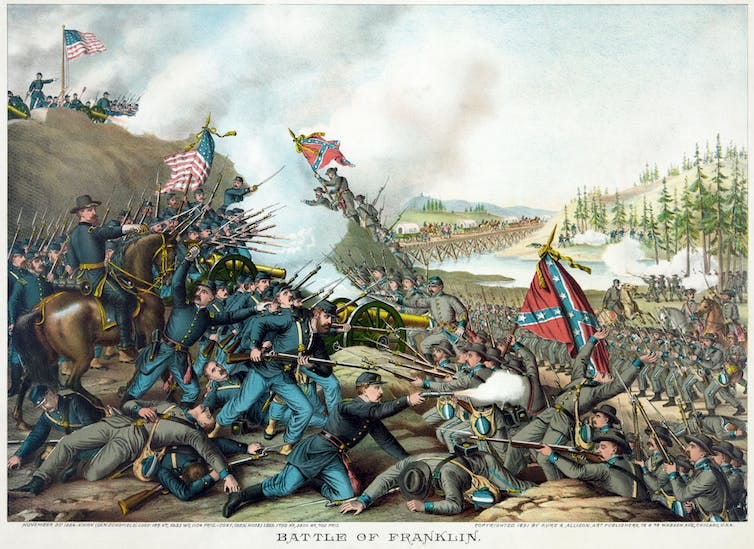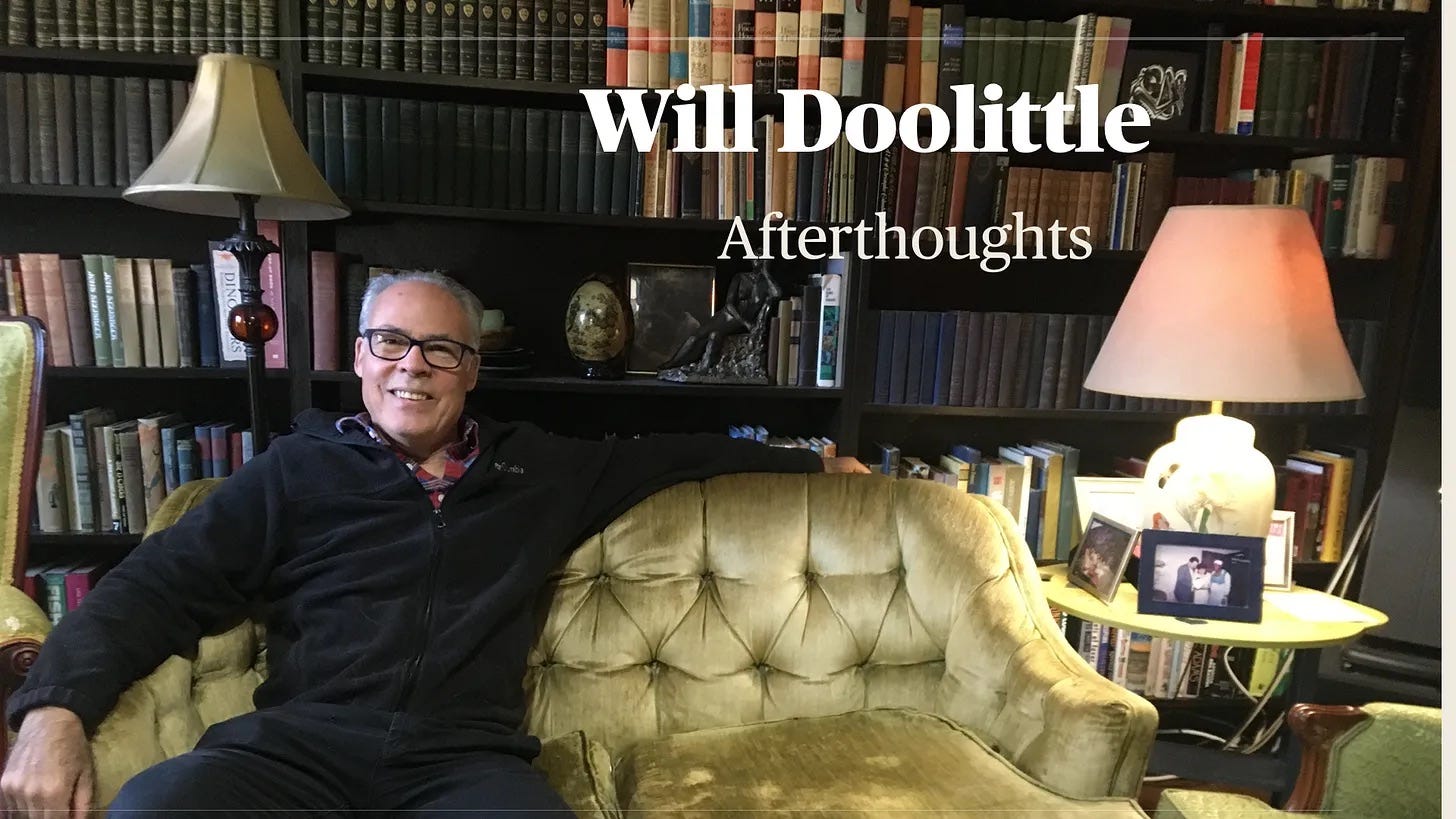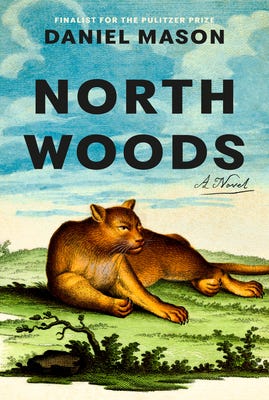Our arguments are smart and well-informed and go nowhere
'North Woods' is fun and a feast for the senses
It gets wearisome explaining to people why it’s wrong to march around with the Confederate battle flag.
Outrage wears me down. And it’s a drag to have events I enjoy, like the Saranac Lake Winter Carnival, tainted by this worst of associations.
We moved to Saranac Lake when I was 10, and my experience there with a handful of middle school bullies has made me ever since a skeptic of the benefits of small town life. But I love the special (cold) beauty of the village. Also, that was 50 years ago. I’ve moved on (mostly) from vivid daydreams of revenge. Can’t Saranac Lake and everywhere else move on from the Confederacy?
The answer, judging from the reactions to the inclusion in the carnival parade of a gaudy monster truck with a Confederate battle flag on its roof, is no.
Jeff Branch, coordinator of the parade, was quoted on the subject in a story in the local paper, the Adirondack Daily Enterprise: “Some people call it heritage. Some people call it racist. I call it a flag.”
Tom Dupree, owner of the truck, was quoted in a North Country Public Radio story: “Everything’s got a different meaning. None of us were there at the time and who made it hate? That’s the biggest thing, who did it and why, and why did it become a symbol of [hate]?”
Those questions have been answered, over and over, until those doing the answering have gotten tired of talking about it.
And in response to Branch, “some people” say all sorts of ignorant things. It is up to those in authority, like parade coordinators, to understand and act on the truth.

Political expression, by tradition, has been prohibited at Saranac Lake Winter Carnival events. Branch followed that tradition this year when he criticized a few musicians who carried pro-Palestinian signs and the Palestinian flag.
Over the years, I’ve written columns condemning displays of the Confederate battle flag at the Washington County Fair, the Franklin County Fair, Ticonderoga’s Fourth of July parade, in a window along the main road into Tupper Lake, at the Newcomb House bar and grill and on pickup trucks and in windows throughout the region.
I once went up to a man’s house in Glens Falls and asked him why he was displaying the Confederate flag in his window. He said it was because he liked the TV show, “The Dukes of Hazzard.”
I’ve wheeled out all the talking points about treason and slavery and mentioned how incongruous it is for people in northern New York, where every village has a Civil War monument commemorating their dead, to celebrate the cause of those responsible.
This argumentative approach assumes that people who hoist the Confederate battle flag don’t know the history. If they did, they of course would not display it — that’s the assumption — but I no longer believe that.
The rise of Donald Trump has convinced me of the uselessness of trying to talk people out of embracing wrongheaded positions and blackhearted politicians.
The urge among liberals like me to point out the unhidden flaws of either Trumpism or the Confederacy, or both, is part condescension, part foolishness. Appeals to reason don’t counter appeals to identity.
It’s time to admit that the notion of white superiority that powers both Trump’s xenophobic policies and the “heritage” nonsense of the Confederate cause cannot be defeated through argument. It has to be kept out of power and prominence with rules and laws, through legal victories in court and electoral ones at the ballot box. It cannot be persuaded to leave. It has to be forced.
Readings
I read “North Woods” by Daniel Mason, published in September of 2023 and a finalist for the National Book Critics Award, praised by the New York Times and Washington Post, etc. Its blurbs effuse, and it is all that I usually avoid in a book. But my sister, who seems to be on a campaign to get me to read contemporary literary novels, the genre I love to hate, gave me this one for Christmas, and I liked it.
The novel starts inauspiciously. Just by reading the jacket, I knew it would trace over the centuries the lives of the inhabitants of a single house in the woods somewhere in the Northeast — a plot gimmick I instinctively disliked. Then Mason started dropping the “s” in plural nouns, like this: “They had come to the spot in the freshness of June, chased from the village by its people, following deer path through the forest, the valleys, the fern groves, and the quaking bogs.” That’s the first sentence of the book, and it made me want to scream.
But I stuck it out, through all the birdsong and frogcroak, and a sort-of story gelled as the book moved along, and it was fun. Mason is unafraid of showing off his cleverness — and, in parts, his writing is impressive. He’s brilliant at moving characters quickly through time and space, which is fortunate, since he traverses three centuries of human experience in 372 pages. Chapter 10, about three-quarters of the way through the book, has reached the present day, or near it, and begins with a woman arriving by plane in Boston in the rain. In two brilliant paragraphs, Mason moves her to inside the airport, then inside her car. Here are the last two sentences of those paragraphs: “As she disembarked, she could hear the drumming rain against the din of tugs and service dollies, carrying in the familiar small of diesel and the sea. Farther along, it fell in sheets against the windows of the terminal, gusted through the levels of the rental garage, beat down upon her windshield as she entered the city traffic, left the city traffic, joined the turnpike, and headed west.”
That flow of language and sensation can be enjoyed throughout. The book is more fable than novel, lacking a novel’s emotional engagement and power. But the fun of the stories and sensory wonder of the writing won me over.




I lived in the south in the 70's, and was surprised to see that many people still flew the Confederate flag. I remember think, "don't they know the war is over?". I was told by someone I knew that some people start teaching their kids as soon as they can talk, to hate black people. Tradition.............I guess. Very sad. People up here in the North Country, I have noticed, do these things out of ignorance, and just following the crowd. They are completely clueless! I belong to the North Country Light Brigade, and we did lights Friday night in support of Ukraine. An elderly woman brought a Ukrainian flag as we were setting up and asked if we would fly it. I had the honor of doing that, and later a woman walked by and thanked us for flying the flag. She said, "Ukraine is my home country", and then walked away. THAT is when a flag can hold a much deeper meaning. A flag to be proud of. In honor of all Ukrainians here in the states, and in Ukraine, I was honored to wave your flag for you.
I have followed the same progression as you, Will, assuming people were simply unaware of all that flag really stands for. But I was wrong and, as you so rightly point out, condescending. As a liberal I want to believe in my fellow humans. I want to assume immigrants come here for a better life, intending to earn they way if given half a chance. And I want to believe bigots’ driving emotion is fear, not hate. But that is also condescending. And wrong. Hate is hate. They know it. They embrace it. They are Proud of it.